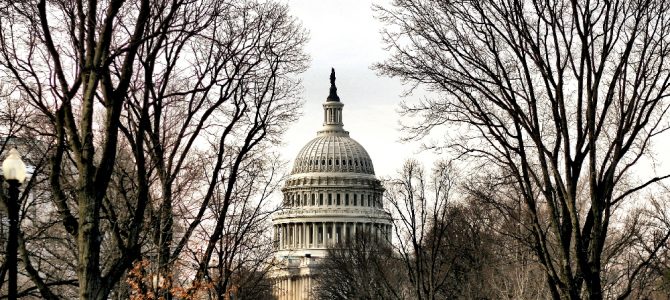
The movement pushing to grant the District of Columbia full statehood is growing. It’s been bolstered by a vote for statehood from District residents and the introduction of H.R. 1291, a bill proposing DC’s admission to the union as a state, by local nonvoting congressional representative Eleanor Holmes Norton.
The District currently operates under a special status carved out by the Constitution and Congress, whereby residents cast votes for president and municipal political leaders (who have substantial power over the District’s day-to-day affairs under the Home Rule Act), as well as an observational representative in Congress. While that status might seem anti-democratic to modern sensibilities, in reality, the Founders wrote in the District’s special status to protect the other states, and American citizens, from federal overreach.
Don’t Forget Why Our Founders Created the District
The Constitution specifically grants Congress the power to “exercise exclusive legislation in all cases whatsoever, over such District (not exceeding ten miles square) as may… become the seat of the government of the United States.”
The Founders intended for the capital of the newly created United States to be a neutral ground for co-equal sovereign states to come together to transact the nation’s business. At the time, state governments were much more powerful than they are today, so a worry about placing the capital within a state was that the state might exercise unfair influence or pressure on the federal government. Today, with the expanded powers of the federal government vis-à-vis the states, the inappropriate influence has the potential to go both ways. Granting DC statehood would put the other 50 states (perhaps minus Virginia and Maryland) at a distinct disadvantage when looking to influence federal policy, grants, and regulation.
In an era of instant communication, it’s easy to forget how important geographic placement of a capital can be, but capital placement histories, both state and federal, belie that assumption. It’s hard to find a state capital museum that doesn’t have a tale of influence-peddling or outright bribery that resulted in the capital’s placement. It beggars the imagination that a DC resident with immediate personal access to the corridors of Congress doesn’t already have more opportunity to influence the decisions made within than someone pulling the lever to vote in Wyoming.
The Founders were aware of the dangers of capital placement, which is why James Madison warned in “The Federalist” No. 43 of bringing “imputation of awe or influence” onto the new national government by placing it within a state. Indeed, Thomas Jefferson considered the location of the future capital of the United States so important that he infamously traded away his opposition to Hamilton’s proposal that the federal government assume state debts in order to assure the capital moved from New York to Jefferson’s native Virginia.
Congress Doesn’t Even Have the Power to Make DC a State
Furthermore, it’s not clear at all that DC can legally follow the same process to join the union as have former territories like the Western states. Because the District’s current status is spelled out in the Constitution itself, it should take a constitutional amendment to change it.
Even legal scholars who consider the current situation in DC to be a “glaring denial of basic rights” admit it would take a constitutional amendment to change the special status of the District, noting that for Congress to have this “conversion to statehood” power would undermine the nature of the compromises that resulted in our current bicameral system of representation.
What would stop Congress from using the District Clause to carve out another area as the new federal district, and therefore create any number of new voting states in succession? Construing Congress’ powers this broadly would give the federal government an enormous advantage over the states unintended by the Framers, a fact previous proponents of DC statehood recognized.
DC Already Has Unfair Access to Federal Power
In an election year where “Drain the Swamp” was a popular rallying cry, and average Americans are increasingly aware of the large gap between themselves and policymakers in Washington, it beggars belief that DC residents feel they don’t already have outsized power over federal policies. It’s no accident that the four richest counties in the country are all in the DC metro area; and much of the real business of the nation’s capital is transacted in District bars and restaurants.
While many DC residents are disconnected from the industry surrounding the federal government, they still benefit from their proximity to Capitol Hill. DC public schools top the nation in per-pupil spending, totaling almost $30,000 per student, and a 2005 tabulation found that DC receives more than twice as much federal money overall per-capita as the next-highest state.
Just Move a Few Blocks
To the modern ear, it sounds outrageous to suggest that voting rights are not the be-all, end-all of modern self-government. Obviously it doesn’t to lots of Americans, given that half or fewer of those eligible to vote actually do so in any given national election. Voting is arguably one of the least-effective ways for a single individual to communicate political preferences.
Furthermore, the District is unique in that it’s ultimately only a few miles away from two states where residents can seek full voting rights, if having the ability to vote for congresscritters is important enough to them. While it may be a burden for some to move five miles away across the Potomac, it usually doesn’t necessitate changing jobs or leaving family behind. (And hey, conservatives have been voting with their feet over gun rights for ages by moving across the river)
Although its special, nonvoting status seems discordant with the modern state of politics, there are good reasons why the Constitution lays out special rules for the federal district. We would do well to remember the cautionary words of the Founders, and accept the unique constitutional deal they wisely laid out for the District of Columbia.









